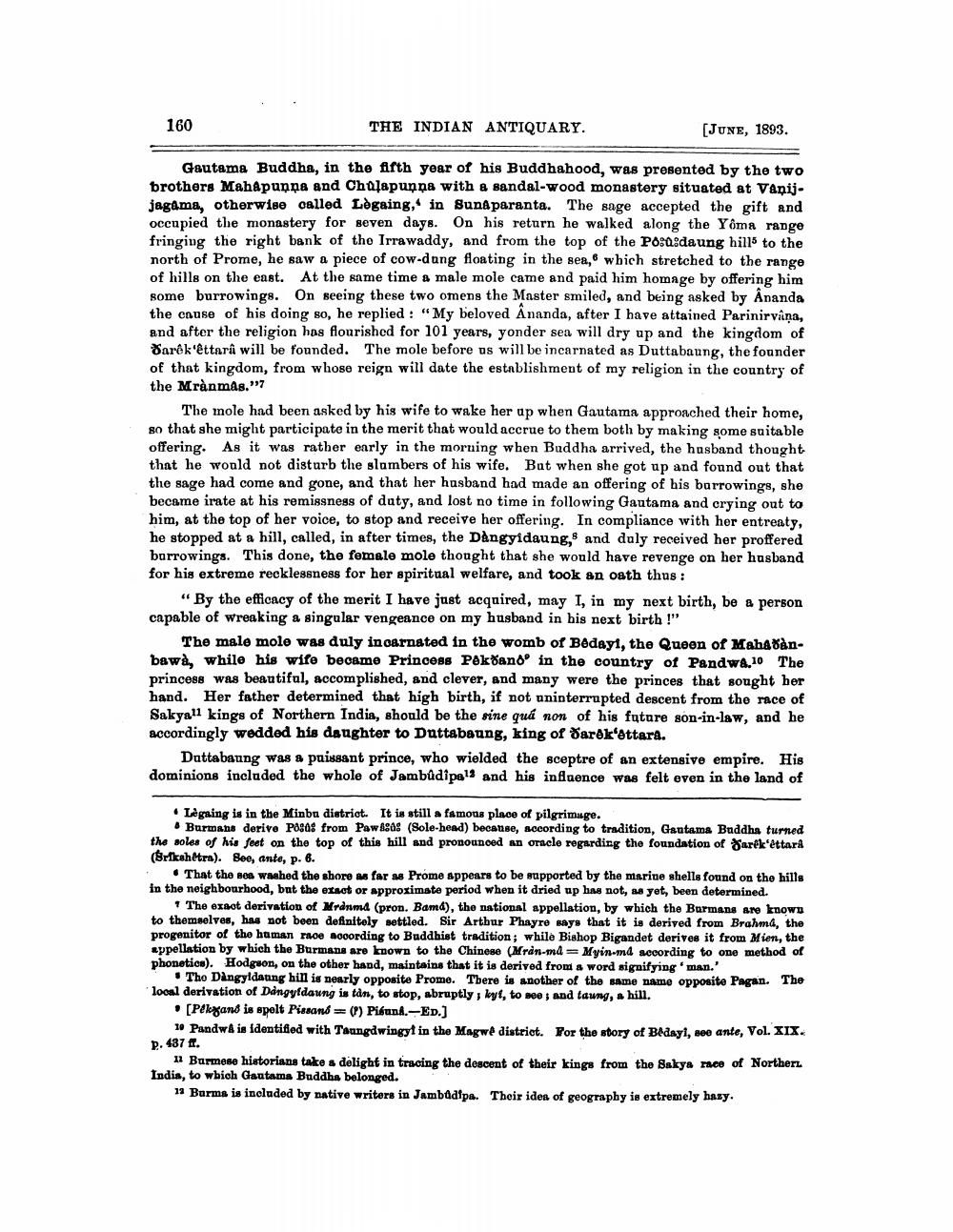________________
160
THE INDIAN ANTIQUARY.
[JUNE, 1893.
Gautama Buddha, in the fifth year of his Buddhahood, was presented by the two brothers Mahápunna and Chalapunna with & sandal-wood monastery situated at Vanijjagama, otherwise called Legaing, in Sunâ paranta. The sage accepted the gift and occupied the monastery for seven days. On his return he walked along the Yôma range fringing the right bank of the Irrawaddy, and from the top of the Po::daung hills to the north of Prome, he saw a piece of cow-dung floating in the sea, which stretched to the range of hills on the east. At the same time a male mole came and paid him homage by offering him some burrowings. On seeing these two omens the Master smiled, and being asked by Ananda the cause of his doing so, he replied: "My beloved Ananda, after I have attained Parinirvana, and after the religion has flourished for 101 years, yonder sea will dry up and the kingdom of Varêk'êttari will be founded. The mole before us will be incarnated as Duttabaung, the founder of that kingdom, from whose reign will date the establishment of my religion in the country of the Mrànmas."
The mole had been asked by his wife to wake her up when Gautama approached their home, so that she might participate in the merit that would accrue to them both by making some suitable offering. As it was rather early in the morning when Buddha arrived, the husband thought that he would not disturb the slumbers of his wife. But when she got up and found out that the sage had come and gone, and that her husband had made an offering of his barrowings, she became irate at his remissness of duty, and lost no time in following Gautama and crying out to him, at the top of her voice, to stop and receive her offering. In compliance with her entreaty, he stopped at a hill, called, in after times, the Dàngyidaung, and duly received her proffered borrowings. This done, the female mole thought that she would have revenge on her husband for his extreme recklessness for her spiritual welfare, and took an oath thus :
"By the efficacy of the merit I have just acquired, may I, in my next birth, be a person capable of wreaking a singular vengeance on my husband in his next birth !"
The male mole was duly incarnated in the womb of Bodayt, the Queen of Maharanbaw while his wife became Princess Pekdando in the country of Pandw4.10 The princess was beautiful, accomplished, and clever, and many were the princes that sought her hand. Her father determined that high birth, if not uninterrupted descent from the race of Sakyall kings of Northern India, should be the sine quá non of his fatore son-in-law, and he accordingly wedded his daughter to Duttabaung, king of darêk'éttara.
Dattabaung was a puissant prince, who wielded the sceptre of an extensive empire. His dominions included the whole of Jambudipal and his influence was felt even in the land of
* Lågning is in the Minbu district. It is still a famous place of pilgrimage.
• Burmans deriva Poses from Paw Asos (Sole-head) because, according to tradition, Gautama Buddha turned the soles of his feet on the top of this hill and pronounced an oracle regarding the foundation of Parék'éttard (Brfkahara). See, ante, p. 6.
That the aes washed the shore as far as Prome appears to be supported by the marine shells found on the hills in the neighbourhood, but the exact or approximate period when it dried up has not, as yet, been determined.
The exact derivation of Myanmd (pron. Bamd), the national appellation, by which the Barmans are knowu to themselves, has not been definitely settled. Sir Arthur Phayre says that it is derived from Brahma, the progenitor of the human race according to Buddhist tradition, while Bishop Bigandet derives it from Mien, the appellation by which the Burmans are known to the Chinese (Mrán-md = Myin.md according to one method of phonetico). Hodgson, on the other hand, maintains that it is derived from a word signifying 'man.'
• Tho Dangyldaung hin is nearly opposite Prome. There is another of the same name opposite Pagan. The local derivation of Dangyfdaung is ton, to stop, abruptly, kyt, to see and lawng, a hill.
. [Pekyant is spelt Pissan= () Pibuni.-ED.)
10 PandwA in identified with Taungdwingyt in the Magwê district. For the story of Bedayi, see ante, Vol. XIX. P. 437 4.
11 Burmese historians take a delight in tracing the descent of their kings from the Sakya race of Northern India, to wbioh Gautama Buddha belonged.
12 Burms is included by native writers in Jambodipa. Their iden of geography is extremely hasy.




